Guides • Perfecting your Craft
Posted on Sep 02, 2022
Verbal Irony: 9 Examples that Will Make You Smirk
About the author
Reedsy's editorial team is a diverse group of industry experts devoted to helping authors write and publish beautiful books.
More about the Reedsy Editorial Team →Martin Cavannagh
Head of Content at Reedsy, Martin has spent over eight years helping writers turn their ambitions into reality. As a voice in the indie publishing space, he has written for a number of outlets and spoken at conferences, including the 2024 Writers Summit at the London Book Fair.
View profile →Verbal irony is a figure of speech in which the literal meaning of what someone is saying is different from what they really mean. For example, someone saying “Just what I needed”, after spilling coffee on their shirt on the way to an important meeting. It is often used to make a point or to express sarcasm, both in literature and in everyday conversation. It can also be used to bring humor to a situation, foreshadow events, or express frustration.
For a better grasp of this type of humor, here are some examples of verbal irony from popular culture:
“Your stunned silence is very reassuring” — Monsters, Inc
Roz (flatly): Hello Wazowski. Fun filled evening plans for tonight?
Mike Wazowski: Well, as a matter of fact —
Roz: — and I’m sure you filed your paperwork correctly. For once.
(pause)
Roz: Your stunned silence is very reassuring.
In Monsters Inc, scare assistant Mike Wazowski tries to leave work without dropping off his paperwork for the day. Unfortunately for Mike, this involves slipping past Roz, the intimidating administrator of ‘Scare Floor F.’ Her dry and deadpan line of questioning, which drips with irony, immediately establishes her place within the company as a terrifying authority figure who terrifies Mike. Of course, Mike’s instincts aren’t too far off, as Roz later reveals herself to be more than meets the eye(!).
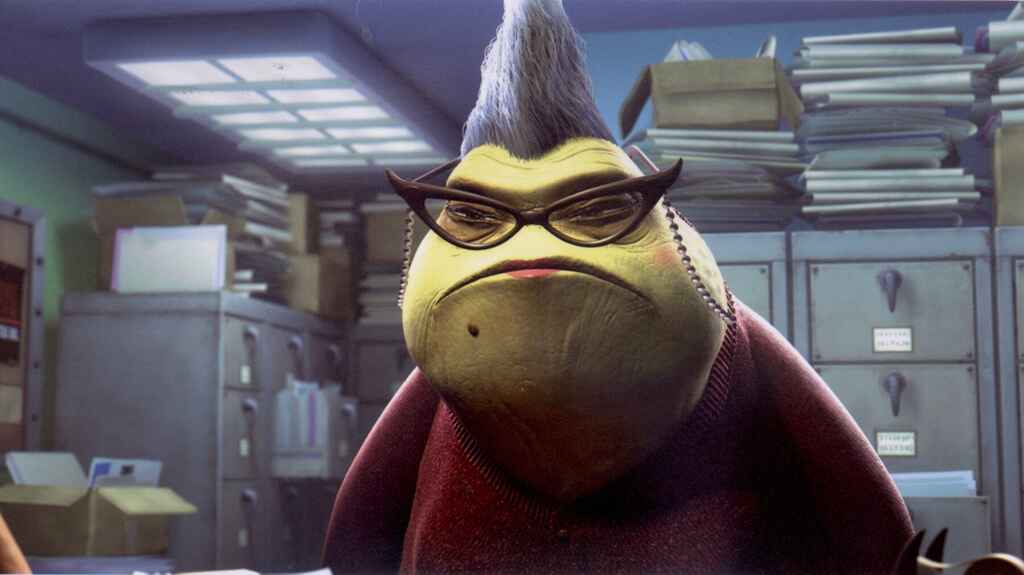
“And Brutus is an honourable man” — Julius Caesar
“Here, under leave of Brutus and the rest–
For Brutus is an honourable man;
So are they all, all honourable men–
Come I to speak in Caesar’s funeral.
He was my friend, faithful and just to me:
But Brutus says he was ambitious;
And Brutus is an honourable man.”
In Shakespeare's Julius Caesar, Caesar has just been murdered by a band of conspirators that includes his ally, Marcus Brutus. Brutus makes an appeal to the people of Rome to justify the killing — saying that his cohorts were, in fact, protecting Rome from Caesar’s ambitions. Brutus briefly wins the crowd’s support until Caesar’s close friend, Mark Anthony, stands to make his famous “Friends, Romans, countrymen” speech.
In his address, Mark Anthony repeatedly calls the conspirators “honourable men” — the irony of which is not lost on the crowd. He singles out Brutus’s justification that Caesar was “ambitious” — and hits home just how weak a reason this was to kill a man. But who are we to argue with Brutus? After all, he is an “honourable man.” But Mark Anthony’s ironic implications are enough to turn the tide of support.
🖊️
Which famous author do you write like?
Find out which literary luminary is your stylistic soulmate. Takes one minute!
“Say Yes to Knope!” — Parks and Recreation
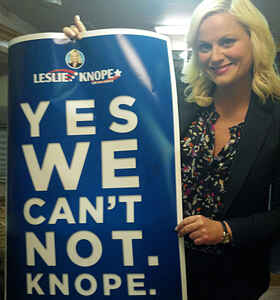
"Yes we can’t not. Knope."
Fiction is packed full of people whose names are the polar opposites of their characters — an irony that often serves to highlight that particular trait. In Parks and Recreation, the city’s irrepressibly positive parks administrator is curiously named Leslie Knope (pronounced ‘nope’). This contradiction was strategically deployed for laughs over the show’s seven seasons, culminating in a real-world billboard for Leslie’s campaign: “KNOPE WE CAN IN 2012”.
Other characters with ironic names include the man-mountain Little John from Robin Hood, Waiting for Godot’s beleaguered slave character (called "Lucky"), and the perpetually ill and lethargic Captain Keene in the Hornblowers series.
"The dead man very considerately got up...” — The Sign of the Four
“What do you think of this, Holmes? Sholto was, on his own confession, with his brother last night. The brother died in a fit, on which Sholto walked off with the treasure. How's that?"
"On which the dead man very considerately got up and locked the door on the inside."
"Hum! There's a flaw there.”
The most accomplished forensic mind of the Victorian age, Sherlock Holmes is not known for his patience with lesser detectives. When police inspector Athenley Jones overlooks a key detail in examining a crime scene, Holmes resorts to a quick barb to set Jones straight.
This use of verbal irony in The Sign of the Four (where he supposes that a dead man has locked a room from the inside) not only reveals Holmes’s cutting demeanor — but also nods his signature use of deductive reasoning: “When you have eliminated all which is impossible, then whatever remains, however improbable, must be the truth.” And in this particular case, as in real life, walking corpses are still in the realm of the impossible.
📚 Sound like something you want to read more of? Check out our comprehensive guide to the Sherlock Holmes books.
“It’s so good to see you too!” — She’s the Man
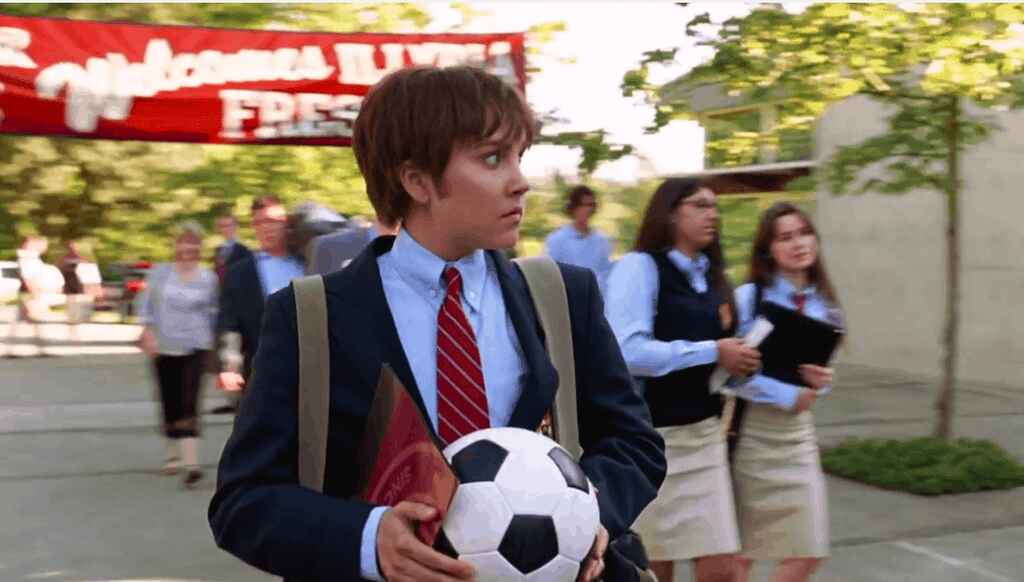
Monique: (running up behind Viola) Sebastian!
Monique whips Viola around, by pulling on her loose-fitting sport jacket.
Monique: Ew, it’s you. God, you and your brother look scary alike from the back. I think it’s your total lack of curves
Viola: Hi Monique, it’s so good to see you too!
When your brother’s girlfriend accidentally mistakes you for him, you’d think she’d apologize or something — instead of adding insult to injury. Well, when this happens to the heroine of She’s The Man (a modern spin on Shakespeare’s Twelfth Night), Viola cuts back at her brother’s vapid girlfriend with a thickly sarcastic, “it’s so good to see you too.” This response reveals a lot about Viola's confident, sassy personality.
In another twist of irony, Monique’s insult gives Viola a solution to her biggest problem: she’s going to pose as a boy so she can join the school soccer team!
“A stranger to one of your parents” — Pride and Prejudice
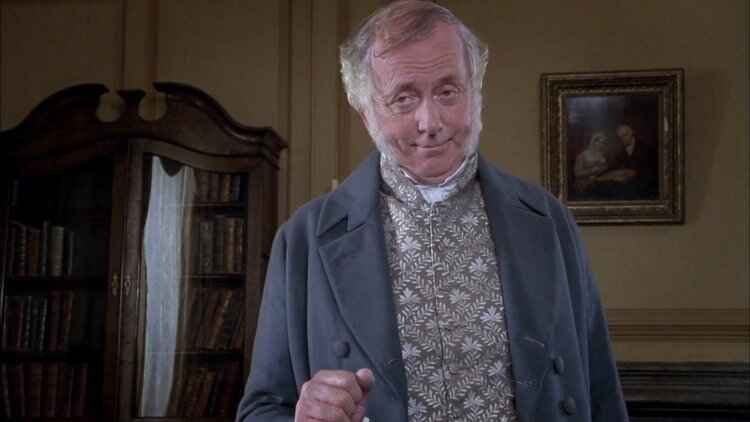
“An unhappy alternative is before you, Elizabeth. From this day you must be a stranger to one of your parents. Your mother will never see you again if you do not marry Mr. Collins, and I will never see you again if you do.”
Lizzie Bennet, of Austen's Pride and Prejudice, finds herself in a tough spot. Her mother wishes for her to marry the insipid Mr. Collins — the heir to her family home — thereby securing the Bennet clan’s future. For the independent and intelligent Lizzie, this future seems as inevitable as it is horrible — until her father finally pipes up.
While he usually leaves all decisions of society and marriage to his over-enthusiastic wife, Mr. Bennett finally decides to speak up against this marital arrangement. While, at face value, Mr. Bennett’s ultimatum makes it sound like he just doesn’t want to spend more time with Mr. Collins than necessary, the reader understands this to be his way of showing support and affection for his favorite daughter.
“And that has made all the difference” – The Road Not Taken
"I shall be telling this with a sigh
Somewhere ages and ages hence:
Two roads diverged in a wood, and I—
I took the one less traveled by,
And that has made all the difference."
We often needlessly sweat over the tiny choices in life: this is the point ultimately made by the narrator of Frost’s “The Road Not Taken,” a poem commonly misread as a celebration of individualism and the adventurous spirit. Oh, the irony!
Faced with a choice between two diverging roads, our hero seems proud that he took the road ‘less traveled by.' He soon realizes that it was pretty much the same once he’d trod through it. In the final stanza, he imagines himself telling others that this choice has ‘made all the difference’ — but his sigh lets us know otherwise! While the path you choose (or the choices you make) might slightly change the journey, in the end, will it have made a difference at all?
“Some animals are more equal than others.” – Animal Farm
"There was nothing there now except a single Commandment. It ran:
ALL ANIMALS ARE EQUAL BUT SOME ANIMALS ARE MORE EQUAL THAN OTHERS
After that it did not seem strange when next day the pigs who were supervising the work of the farm all carried whips in their trotters."
The pigs in George Orwell's Animal Farm set out with pure intentions to create an egalitarian society amongst the barnyard animals. However, they slowly grew power hungry and ironically ended up establishing a dictatorship even worse than the former humans who ruled them. While the statement starts by saying ‘all animals are equal,' it goes on to say that ‘some are more equal than others,’ defeating the entire premise laid down in the first part of the statement. This highlights the hypocrisy of the pigs, whose previously secret disdain for other animals is now writ large.
“Vintage, so adorable.” – Mean Girls
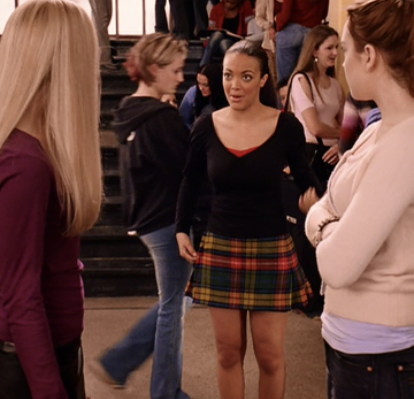
Regina: Oh my God, I love your skirt! Where did you get it?
Lea Edwards: It was my mom's in the '80s.
Regina: Vintage, so adorable.
Lea Edwards: Thanks!
(Lea leaves)
Regina (quietly, to Cady): That is the ugliest effing skirt I've ever seen.
In line with her status as Queen Bee, Regina George gives another girl the ultimate stamp of approval by telling her, apropos of nothing, that she loves her skirt. However, she doesn’t mean one word of her compliment — this secretly sarcastic comment was a status play designed to show new girl Cady Heron the power and influence she wields at this high school.
Ready for more irony? Well, buckle up and check out our next post, which digs up a delicious serving of situational irony.


